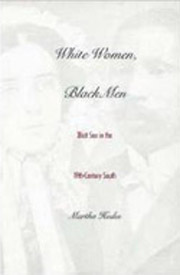White Women, Black Men
Illicit Sex in the Nineteenth-Century South
Published by Yale University Press
White Women, Black Men is the first book to explore the history of one of the most explosive categories of illicit sex in American history. Striking at fundamental understandings of race and sexuality, Hodes demonstrates that only with the advent of black freedom after the Civil War did sex between white women and black men provoke extreme white alarm. Following the upheaval of war and emancipation, transgressors were targeted by the Ku Klux Klan in a pattern of violence that culminated in unprecedented white terrorism by the end of the century.
Reviews
“We are now most fortunate in having Professor Hodes’s very original, revealing, and important book on a neglected subject. It deserves a close and respectful reading, and many readers.” —C. Vann Woodward, New York Review of Books
“An enthralling book.” —David Nicholson, Washington Post
Winner of the Allan Nevins Prize for Literary Distinction in the Writing History —Society of American Historians
Honorable Mention, Outstanding Book —Gustavus Myers Center for the Study of Bigotry and Human Rights
a “fascinating and well-researched book. . . . This is a great book for those interested in African American history, women’s studies, the Civil War, or the history of race relations in the U.S.” —Booklist
“A brilliant work, imaginatively researched and well written. Highly recommended.” —Library Journal
A “highly perceptive analysis of a controversial subject.” —François Furstenberg, The Reader’s Catalog
“The voices of those involved, black and white, male and female… come through poignantly in this remarkable book.” —Julie Winch, Women’s Review of Books
“both engrossing and disturbing. . . . Hodes has done a remarkable job in reconstructing numerous accounts of illicit relationships for which, she acknowledges, the evidence is often thin. . . . Ultimately, she has crafted an absorbing and original account that makes important and telling observations about race, sex, and politics in the American South.” —Journal of American History
“provocative . . . . a breathtaking display of historical sleuthing. . . . a unique and compelling portrait . . . a masterful work that fully deserves the acclaim that it has received.” —Journal of Interdisciplinary History
“This is clear-headed and serious historical work . . . likely to become a hardy perennial. White Women, Black Men documents the multivalent power of the best historical scholarship.” —Reviews in American History
“We are indebted to Hodes for her careful examination of these cases and for advancing a provocative thesis . . . . This important book deserves careful reading.” —Journal of Southern History
White Women, Black Men “presents widespread social currents represented in poignant individual cases.” —Journal of the Royal Anthropological Institute
“… both fascinating and horrifying in equal measure. . . . Hodes’s research into the subject of white women’s relationships with black men in the South is both detailed and powerfully presented. . . . Hodes has shown how historians might begin to reconstruct the past in a vivid and complex way. . . ” —Journal of American Studies
Hodes “puts to rest the notion that southern whites were always united and consistent in their denunciation of black male and white female sexual relations during the nineteenth century.” —North Carolina Historical Review
“a fascinating study . . . . Professor Hodes’s research is prodigious, her text well-written, and her argument well-crafted.” —Journal of the History of Sexuality
“The author is an engaging storyteller and an able stylist. Scholars and students of American history must incorporate her very important findings into the historical record if we are to better understand the relationship of race, class and sex in the American South.” —American Journal of Legal History
“a fascinating and important contribution . . . Her carefully drawn-out case studies add nuance, drama, and character. . . . both broad and wonderfully particular, about the relationships before and behind the myth.” —Journal of the Early Republic
a “fascinating study. . . . an important, insightful, and beautifully written contribution to the literatures on Reconstruction and the lynching era, the historical construction of racial categories, and the history of sexuality.” —Law and History Review

